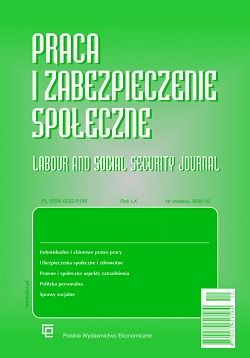
- Workplace Collective Bargaining - Hope for Social Dialogue? (3-14)
The article presents the legal conditions and practice of company collective agreements. The starting point is the analysis of the provisions shaping the workplace collective agreements, including the principles of their conclusion, the mechanism of their validity and relations to other autonomous sources of labor law. Against this background, data are presented on the number of concluded and binding company agreements and the scope of coverage of employees and other persons to whom collective agreements are applied. The presented data is the result of research carried out in district labor inspectorates and a compilation of analyzes and reports prepared by Chief Labor Inspectorate. The authors attempt to assess the potential and actual role of workplace agreements in shaping employment conditions, especially in the face of the complete collapse of multi-employer negotiations. - The conscience clause in the employment of a journalist (15-23)
Legal guarantees of the possibility of undertaking and pursuing activities by a journalist are essential for fulfilling his mission of serving society and the state. Among them, for many years media studies have considered the necessity to introduce the so-called the journalistic conscience clause. It finally took the normative form in 2017. Its content and meaning require consideration from both the media studies and the legal perspective , which the authors make in this article. - "Remote work as an institution of labor protection law" - Report from the conference (24-26)
On January 21, 2021, a nationwide scientific conference "Remote work as an institution of labor protection law" was held, organized by the Department of Labor Law at the University of Lodz and the Polish Scientific Network of Law Labor and Social Security COOPERANTE via the MS Teams platform . The conference aroused great interest both on the part of academia and law practitioners. It was attended by 110 participants representing 15 research centers, as well as the National Labor Inspectorate, the Social Insurance Institution, and NSZZ "Solidarność". - Obligation to inform employees about employment conditions in the light of the new EU Directive 2019/1152 (27-40)
The article concerns the obligation to inform employees about employment conditions resulting from the new EU directive on transparent and predictable working conditions in the EU. The author indicates the purpose of the new directive, but most of all focuses on the changes introduced in it in comparison with the solutions adopted in the discussed scope in Directive 91/53 / EEC, which is still in force, taking into account the subjective and objective scope and the manner of implementing the obligation. The article also attempts to make a preliminary, general assessment of the provisions of Polish law from this perspective. - Equalization of sickness insurance benefits with reduced working hours (41-48)
The author presents the issue of the impact of reduced working hours on the basis of collective agreements and other solutions provided for in subsequent anti-crisis shields on sickness insurance benefits. Analyzes the introduced covid solutions aimed at minimizing losses on this account in people with parental and caring roles . The author also questions the legitimacy of maintaining the current wording of Art. 40 of the Benefit Act. - The admissibility of concluding an employment contract with a majority shareholder of a limited liability company in the light of jurisprudence (49-56)
The rules of employing managerial staff, despite numerous voices in the literature about the need to regulate them, have not yet been covered by the regulation eliminating the existing state of uncertainty. The article presents an analysis of the admissibility of employee employment of majority partners of limited liability companies based on statements of the judicature. In the existing jurisprudence, it is uniformly assumed that it is inadmissible to employ an employee partner of a single-person limited liability company in this company. On the other hand, situations where , in addition to the dominant partner, are also problematic in terms of legal classification, there is also a partner or partners whose total share in the company is so small that it can be assumed that it does not affect the functioning of the company. In the latest judgments, there is a noticeable tendency to use more and more of the so-called an illusory partner, which requires the adoption of the legal fiction of the existence of a one-person company despite the formally multi-person entity. So the question arises as to what proportion of shares in the company's capital is when a shareholder becomes almost the sole shareholder, and the remaining shareholder becomes an "illusory" shareholder. - The exclusion or modification of the protection of the durability of the employment relationship of particularly protected employees in the Collective Redundancies Act (61-63)
The author presents the conclusions drawn from the Supreme Court's jurisprudence regarding the modification of the protection of particularly protected employees in situations covered by the provisions of the Collective Redundancies Act . In particular, it concerns the division of these employees into different categories and the conditions for the possibility of applying termination of employment and remuneration conditions to tchem. - Operating part-time (64)
Praca i Zabezpieczenie Społeczne (Work and Social Security) - the whole list






